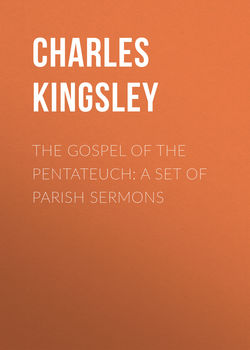Читать книгу The Gospel of the Pentateuch: A Set of Parish Sermons - Charles Kingsley - Страница 5
SERMON IV. NOAH’S FLOOD
Оглавление(Quinquagesima Sunday.)
GENESIS ix. 13. I do set my bow in the cloud, and it shall be for a token of a covenant between me and the earth.
We all know the history of Noah’s flood. What have we learnt from that history? What were we intended to learn from it? What thoughts should we have about it?
There are many thoughts which we may have. We may think how the flood came to pass; what means God used to make it rain forty days; what is meant by breaking up the fountains of the great deep. We may calculate how large the ark was; and whether the Bible really means that it held all kinds of living things in the world, or only those of Noah’s own country, or the animals which had been tamed and made useful to man. We may read long arguments as to whether the flood spread over the whole world, or only over the country where Noah and the rest of the sons of Adam then lived. We may puzzle ourselves concerning the rainbow of which the text speaks. How it was to be a sign of a covenant from God. Whether man had ever seen a rainbow before. Whether there had ever been rain before in Noah’s country; or whether he did not live in that land of which the second chapter of Genesis says that the Lord had not caused it to rain upon the earth, but there went up a mist from the earth and watered the face of the ground, as it does still in that high land in the centre of Asia, in which old traditions put the garden of Eden, and from which, as far as we yet know, mankind came at the beginning.
We may puzzle our minds with these and a hundred more curious questions, as learned men have done in all ages. But—shall we become really the wiser by so doing? More learned we may become. But being learned and being wise are two different things. True wisdom is that which makes a man a better man. And will such puzzling questions and calculations as these, settle them how we may, make us better men? Will they make us more honest and just, more generous and loving, more able to keep our tempers and control our appetites? I cannot see that. Will it make us better men merely to know that there was once a flood of waters on the earth? I cannot see that. If we look at the hills of sand and gravel round us, a little common sense will show us that there have been many floods of waters on the earth, long, long before the one of which the Bible speaks: but shall we be better men for knowing that either? I cannot see why we should. Now the Bible was sent to make us better men. How then will the history of the flood do that?
Easily enough, my friends, if we will listen to the Bible, and thinking less about the flood itself, think more about him who, so the Bible tells us, sent the flood.
The Bible, I have told you, is the revelation of the living Lord God, even Jesus Christ; who, in his turn, reveals to us the Father. And what we have to think of is, how does this story of the flood reveal, unveil to us the living Lord of the world, and his living government thereof? Let us look at the matter in that way, instead of puzzling ourselves with questions of words and endless genealogies which minister strife. Let us look at the matter in that way, instead of (like too many men now, and too many men in all ages) being so busy in picking to pieces the shell of the Bible, that we forget that the Bible has any kernel, and so let it slip through our hands. Let us look at the matter in that way, as a revelation of the living God, and then we shall find the history of the flood full of godly doctrine, and profitable for these times, and for all times whatsoever.
